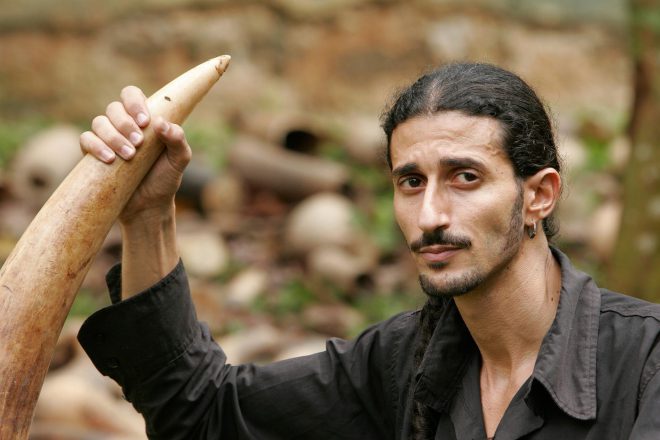Eight years ago Ofir Drori, now 31, set off for Africa. He was looking for adventure and work as a photojournalist. Inspired by animal right’s activists Jane Goodall and Dian Fossey, Israeli Drori got in deeper than he expected.
He is now fighting crime and corruption in the animal trade business in Africa – working to stop animal trafficking and poaching. Based in the Nlongkak Valley in Cameroon, Drori heads the Last Great Ape Organization, known for short as LAGA.
LAGA was founded in Israel by Drori and other Israeli conservation colleagues including the editor of the Israeli Geographical magazine, and the manager of the Safari, a safari park near Tel Aviv.
The organization, which is based in the Cameroon, is small and lean, with just 10 team members. Its mission is to make sure that a 1994 law in Cameroon made to protect endangered species, such as gorillas, elephants, chimps and lions, is enforced.

Ofir Drori with his rescue chimp
Before Drori no one had been prosecuted for trafficking or poaching animals in most of Central and West Africa. Estimates say that about 3,000 gorillas, 4,000 chimps and about 4,000 elephants are killed each year in Cameroon.
While organizations such as the World Wildlife Foundation are in place to fight such violations, their effectiveness is damaged by corruption on the local level, Drori, the organization’s executive director says.
Looking at Goodall, who devoted a part of her life to saving chimps in Tanzania, Drori says, “Jane Goodall was predicting the start of ape extinction within 15 years. This brought me to Cameroon to write about this crisis. Searching for the heroes fighting to change this forecast, I found a larger problem instead.”
Although there is a law to prevent the killing of endangered animals such as gorillas, and lions (known by locals as bushmeat), Drori started researching into why it wasn’t being enforced.
His impetus to start LAGA (now called EAGLE) came from a shocking encounter at a remote village, known for its extensive ape trade. “I was led to an infant survivor of the bushmeat trade,” he says, “a baby chimp, tied up abused and sick, in a dirty room. His eyes were like those of human babies, but nobody seemed to notice.”
Drori knew that if nothing was done, the chimp would die. Appealing to the local authorities didn’t seem to help. He bluffed the poachers, and got them to hand him over the chimp. “I untied him from his ropes,” he reports “and hugged him. In seconds he was transformed to a baby and he clung to my chest like it was an island of safety.”
Drori saved the chimp he named Future, and decided to open a wildlife law enforcement NGO to fight for and save the lives of other animals.
Defending wildlife from extinction is a moral obligation, says Drori – a cause worth dedicating one’s life to. Drori, who grew up in a suburb of Tel Aviv, was always drawn to the natural world and to Africa in particular. As a youth he attended the Nature School in Jaffa and traveled to Africa for the first time before joining the army.
Only two months after finishing his three-year military service – while his friends were heading to Goa and Tierra del Fuego – Drori opted to return to Africa. Although Drori had no experience in animal conservation prior to founding LAGA four years ago, he recognized that this lack of knowledge could also be an advantage.
“LAGA was born out of criticism against the failure of conservation and the realities of the foreign aid business in general,” he says. He is looking to create “a paradigm shift.”
The efforts have paid off. From a baseline of zero, Cameroon is now monitoring its wildlife traffickers. A majority of those convicted end up with long imprisonment terms, says Drori.
Wildlife traffickers usually get caught by LAGA’s undercover spy network. Their work has helped break down an international ring of ivory smugglers selling products to Hong Kong.
To take the organization to the next level, one of the crew Njike Horline, a lawyer who heads LAGA’s legal department, is now in the US by invitation of the US Embassy in Cameroon to learn about the American court of justice system.
“If repressive measures are not taken to control commercial hunting, we risk losing these animals in 10 to 15 years,” says Drori.
Read more on animal trafficking:
Ofir is stopping poaching in Cameroon
Dubai Porsche driver walks cheetah on a leash
Live Baby Leopard Found in Suitcase En Route to Dubai
Injured Cheetah Discovered on the Streets of Abu Dhabi






